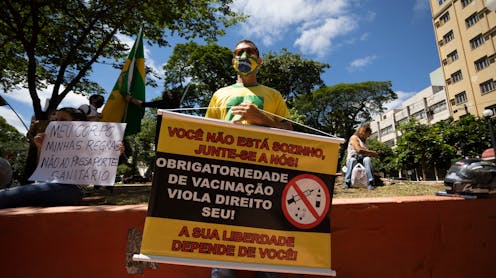Detta inlägg post publicerades ursprungligen på denna sida this site ;
Date:
Author: Gemma Ware, Host, The Conversation Weekly Podcast, The Conversation
Original article: https://theconversation.com/fake-cures-and-vaccine-passports-for-sale-the-conspiracy-communities-in-brazil-monetising-the-anti-vax-movement-podcast-255142
Few places on earth are immune to the explosion of anti-vaccination conspiracy theories and health disinformation fuelled by the COVID pandemic. But in countries like Brazil, where the disinformation flowed from the very top of government, the problem is even more acute and some people are exploiting the fear of others to make money.
In this episode of The Conversation Weekly, we hear about new research out of Brazil into how peddlers of disinformation on social media also sell fake cures and vaccine detoxes. And we ask why some people are looking for solutions to their health problems in these dangerous chemicals and unproven protocols.
Brazil used to be a country with a strong culture of vaccination. “It was like a ritual”, remembers Igor Sacramento, a researcher in public health at the Oswaldo Cruz Foundation in Brazil. As a child, he would go to public squares where people would be dressed in costumes, parading, alongside the vaccination drives.
Now, anti-vax disinformation has surged in the country. Sacramento believes the big change was the election of Jair Bolsonaro in 2018, a president who publicly questioned vaccinations. “It was terrible for public health”, he says. Research showed that during the pandemic there was a persistent “Bolsonaro effect” with higher death rates from COVID in pro-Bolsonaro municipalities.
Vaccination rates for a number of different diseases have fallen in Brazil in recent years, although they are beginning to climb again since the election of Luiz Inácio Lula da Silva for a third term as president in 2023.
Promoting fake cures
New research led by Ergon Cugler, a researcher at the Brazilian Institute of Information on Science and Technology who is mapping the spread of disinformation on social media in Latin America and the Caribbean, is showing that the same people sowing fear with health disinformation are also selling fake cures.
Cugler scraped data from more than 1,000 Telegram groups linked to disinformation and conspiracy theories topics over the last decade. Of the 5 million users in these groups, half are in Brazil. His dataset of 61 million pieces of content showed a 290% increase in anti-vaccination conspiracy narratives during the pandemic in Brazil, as well as a 15,000% increase in autism-related disinformation in Latin America and the Caribbean since the pandemic.
Admins on these conspiracy theory communities on Telegram often post adverts, testimonials and videos promoting fake cures, vaccine detoxes and falsified vaccination passports. Cugler says:
They spread the feeling of fear suggesting that parasites, for example, could cause diseases like diabetes. And then they offer so-called miracle cures, like deworming protocols or chlorine dioxide, and other substances, and they monetise all of those products.
Cugler is also tracking how conspiracy theory groups discussing seemingly quite unconnected topics can be used as a way to funnel people into anti-vax groups and sell them fake cures.
Listen to the full episode of The Conversation Weekly podcast to hear interviews with Ergon Cugler and Igor Sacramento, plus a conversation with Daniel Stycer, editor of The Conversation Brazil.
This episode of The Conversation Weekly was written and produced by Gemma Ware with assistance from Mend Mariwany. Mixing and sound design by Eloise Stevens and theme music by Neeta Sarl.
Listen to The Conversation Weekly via any of the apps listed above, download it directly via our RSS feed or find out how else to listen here.
Ergon Cugler has previously received a research grant from the Brazilian Institute of Information in Science and Technology (IBICT) and is currently part of a research project funded by the National Council for Scientific and Technological Development through the Observatory of Informational Disorder and Public Policy (DesinfoPop) at the Getulio Vargas Foundation. Igor Sacramento is a researcher in residence between December 2024 and July 2025 at the École des Hautes Études en Sciences Sociales in France.
